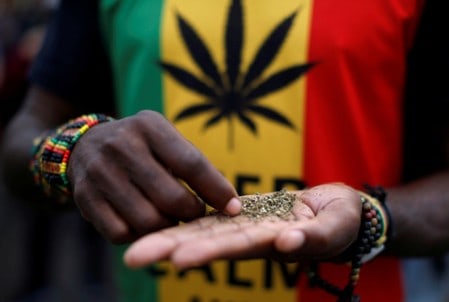MEXICO CITY (Reuters) – More governments should turn away from a repressive war on drugs that has “failed” and look to proven strategies to implement regulated markets for risky substances, a group of former presidents and leaders said in a report published Monday.
Since the group that includes 12 former heads of state began advocating for an end to drug prohibition in 2011, a growing number of countries and U.S. states have created medical or recreational markets for marijuana.
Now the group is looking at ways to smooth the way out of prohibition, recommending countries start regulating lower-potency drugs as well as reforms to international treaties that require prohibition and punishment.
“The international drug control system is clearly failing,” said Helen Clark, a former prime minister of New Zealand. “The health … of nations is not advanced by the current approach to drug control.”
By taking control of illegal drug markets, the report argues governments can weaken the powerful criminal gangs that have grown despite decades of efforts to stamp them out.
The report, “Regulation: The Responsible Control of Drugs” by the Global Commission on Drug Policy, will be released at an event on Monday in Mexico City.
The commission chose to launch its report in Mexico, whose criminal gangs are top suppliers of heroin, methamphetamine, cocaine and marijuana to the United States and where gang-related violence has driven murders to a record high.
“Mexico is the most important country in the fight against drugs,” said former Colombian president Cesar Gaviria.
Mexico’s recent history exemplifies the report’s claim that evidence shows arresting drug traffickers has little impact on drug supply and may increase violence.
Just over 10 years ago, Mexico intensified its battle with drug gangs by sending out the military to battle traffickers.
While dozens of kingpins have been captured or killed, the number of gangs operating in Mexico has multiplied as new criminal leaders step into the breach and battle over turf.
The commission recommends governments open participatory processes to shape reforms toward regulation.
Incoming Mexican President-elect Andres Manuel Lopez Obrador has already started to hold town-hall reviews on violence and discuss potential “amnesty” for non-violent drug traffickers and farmers. Members of his team have said Mexico will evaluate creating legal markets for marijuana as well as opium.
The report calls for a renegotiation of the international treaties that created a “repressive” strategy where drug users and low-level dealers face stiff prison sentences, but it cautions nations are far from a global consensus yet.
Canada will legalize recreational marijuana use on Oct. 17, and it recognizes it is violating treaties.
“Current drug policies are reducing neither the demand nor the supply of illegal drugs, quite the contrary, while the increasing power of organized crime is a sad reality,” writes Ruth Driefuss, the former president of Switzerland and chair of the commission.
(Reporting by Michael O’Boyle)


